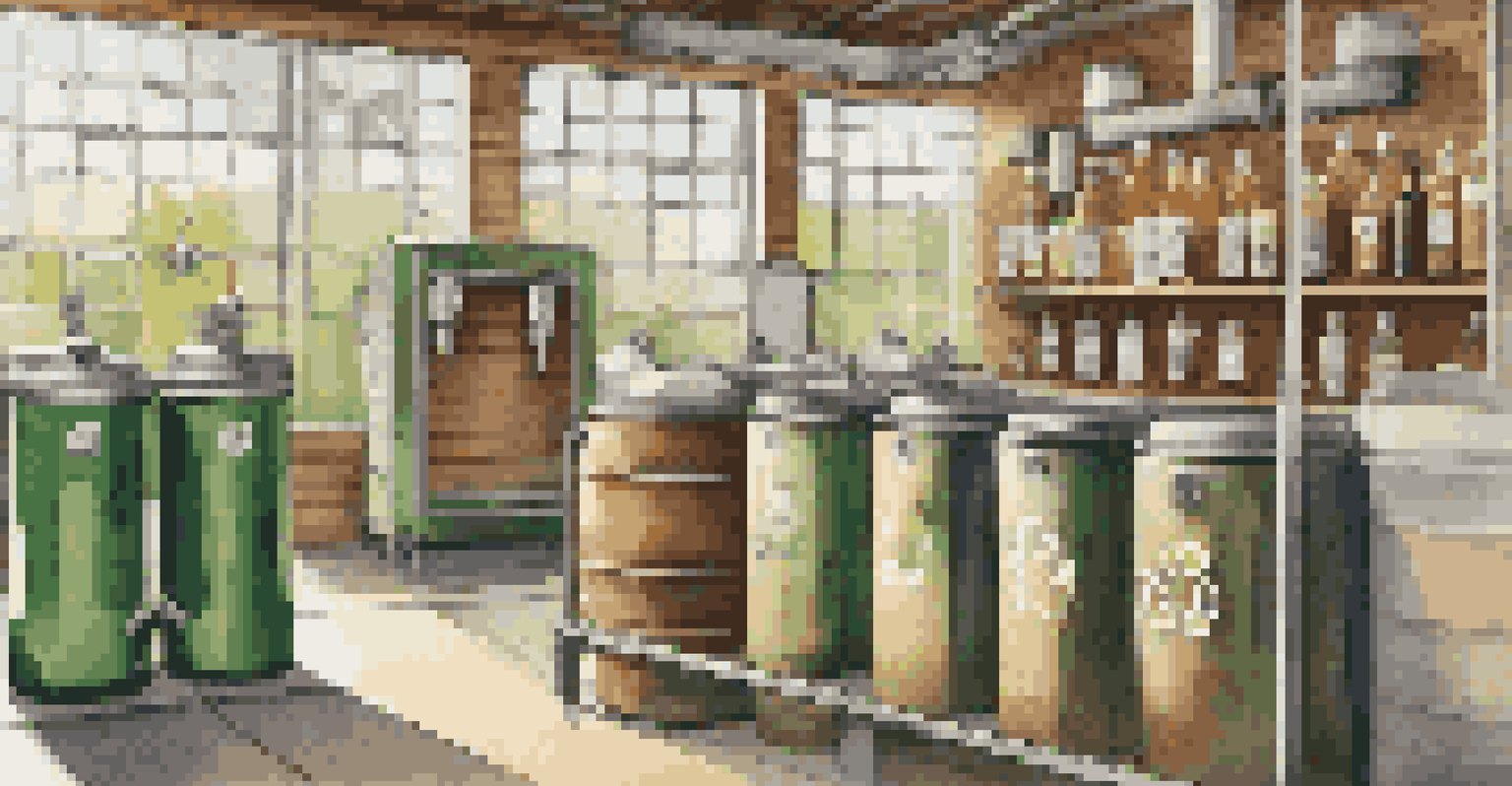Home Brewing and Sustainability: Eco-Friendly Practices

Understanding the Environmental Impact of Brewing at Home
Home brewing is not just a fun hobby; it can also have significant environmental implications. From the ingredients you use to the energy consumed during the brewing process, every aspect can impact the planet. It's essential to recognize these effects to make more sustainable choices in your brewing practices.
The greatest threat to our planet is the belief that someone else will save it.
For instance, traditional brewing often involves ingredients that require substantial water and energy to produce. By opting for local, organic ingredients, you can minimize your carbon footprint while supporting local agriculture. This not only benefits the environment but also enhances the flavor and quality of your home-brewed beverages.
Additionally, consider the waste generated during brewing. Items like bottles, caps, and packaging can pile up quickly. Understanding the full cycle of your brewing activities allows you to implement changes that significantly reduce waste and promote a sustainable approach.
Choosing Organic and Local Ingredients for Brewing
One of the most impactful ways to make your home brewing more sustainable is by sourcing organic and local ingredients. Organic grains and hops are often grown without harmful pesticides and fertilizers, which helps protect ecosystems and biodiversity. This choice not only benefits the environment but also enhances the quality of your brew.

Local ingredient sourcing means shorter transportation routes, which significantly reduces your carbon emissions. By visiting local farms or farmers' markets, you can find fresh ingredients that often come with a lower environmental impact. Plus, supporting local producers strengthens your community and fosters relationships with those who share your passion for brewing.
Choose Local, Organic Ingredients
Sourcing local and organic ingredients not only reduces your carbon footprint but also enhances the quality of your brew.
For example, using locally sourced honey instead of refined sugars can not only add unique flavors to your brew but also supports local beekeepers. This practice contributes to pollinator health, which is vital for a thriving ecosystem. Embracing local ingredients is a win-win for your brew and the planet.
Implementing Water Conservation Techniques in Brewing
Water is a crucial component of brewing, but it's also a precious resource. Implementing water conservation techniques can help make your brewing practices more sustainable. Simple actions like reusing water for cleaning or collecting rainwater can significantly reduce your water footprint.
Sustainability is no longer about doing less harm. It's about doing more good.
Consider using a water-efficient brewing method, such as partial-volume boiling. This approach requires less water while still producing high-quality beer. Additionally, you can save water by efficiently managing your cleaning process and using the least amount necessary for each step.
For instance, after brewing, the water used can be repurposed for watering your garden. This not only maximizes your water use but also nourishes your plants, creating a beautiful cycle of sustainability. By being mindful of water usage, you can enjoy brewing while minimizing environmental impact.
Reducing Energy Consumption During the Brewing Process
Brewing beer requires energy, but there are various ways you can reduce energy consumption in the process. For example, using an energy-efficient brewing system can make a significant difference. Electric kettles or induction cooktops often use less energy than traditional gas stoves, making them a more eco-friendly choice.
Another approach is to brew in larger batches. While it may seem counterintuitive, brewing more beer at once can lead to lower energy usage per batch. This is because the energy used to heat water and maintain temperatures can be spread across more finished product, making it a more efficient process overall.
Implement Water Conservation
Utilizing water-saving techniques in brewing can significantly reduce your overall water footprint.
Additionally, consider using solar energy to power your brewing equipment. Installing solar panels can drastically reduce your reliance on fossil fuels and lower your energy bills. By taking these steps, you can enjoy your brewing hobby while contributing to a more sustainable future.
Sustainable Packaging Solutions for Home Brewers
Packaging is a significant aspect of brewing that can have a lasting environmental impact. Opting for sustainable packaging solutions can help reduce waste and promote eco-friendliness. Consider using reusable growlers or bottles instead of single-use containers to minimize your environmental footprint.
When it comes to labels and caps, look for biodegradable or recyclable options. There are many brands that now offer products made from sustainable materials, making it easier than ever to package your brew responsibly. This small change can make a big difference in reducing landfill waste.
Moreover, think about sharing your brew with friends and family using refillable containers. This not only fosters community and connection but also encourages others to consider sustainable practices in their brewing endeavors. By prioritizing sustainable packaging, you contribute to a circular economy and promote a culture of sustainability.
Repurposing Brewing Byproducts for Eco-Friendly Uses
Brewing generates byproducts that, if not managed properly, can end up in landfills. However, many of these byproducts can be repurposed, providing an eco-friendly solution and minimizing waste. For instance, spent grain can be used as animal feed, compost, or even in baking recipes, reducing food waste significantly.
Another byproduct, hops, can be utilized in various ways, such as in gardening to deter pests or in making homemade soaps and skincare products. By creatively repurposing these materials, you can contribute to a more sustainable lifestyle while reducing your overall waste.
Embrace Sustainable Packaging
Opting for sustainable packaging solutions helps minimize waste and promotes eco-friendliness within the brewing community.
Additionally, educating yourself about local composting programs can help you dispose of brewing byproducts responsibly. Many communities offer composting services that can turn your organic waste into nutrient-rich soil for local gardens. Embracing this practice not only benefits your brewing process but also supports broader sustainability efforts.
Building a Community Around Sustainable Home Brewing
Creating a community focused on sustainable home brewing can amplify your efforts and inspire others. By sharing your experiences and knowledge with fellow brewers, you can foster a culture of eco-friendliness within your local brewing scene. Organizing workshops or social events can be an excellent way to spread awareness and motivate others to adopt sustainable practices.
Consider joining or starting a local home brewing club that emphasizes sustainability. This collaborative environment encourages members to share tips, resources, and best practices, creating a supportive network for eco-conscious brewers. Plus, learning from one another can lead to innovative ideas and solutions.

Online forums and social media platforms also provide a space for discussing sustainable brewing practices. Sharing your successes and challenges can inspire others to make eco-friendly choices in their brewing journey. By building a community focused on sustainability, you're not only enhancing your own brewing experience but also contributing to a greener future.